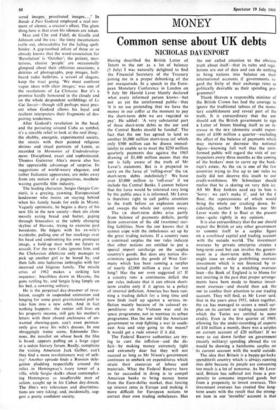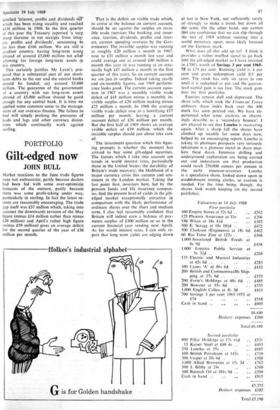MONEY Common sense about UK debts
NICHOLAS DAVENPORT
Having described the British Letter of Intent to the IMF as a lot of baloney (5 July) I was naturally delighted to find the Financial Secretary of the Treasury joining me in a proper debunking of the IMF masquerade. In a speech to the Euro- pean Monetary Conference in London on 9 July Mr Harold Lever bluntly declared what every informed person knows—but not as yet the uninformed public—that 'it is no use pretending that we have the money in our coffer at the moment to pay the short-term debt we are requited to pay'. He added: 'A very substantial part of these short-term debts to the IMF and the Central Banks should be funded'. The fact that the IMF has agreed to lend us another $1,000 million short-term (of which only $500 million can be drawn immed- iately) to enable us to meet the $250 million quarterly payments due against the 1965 drawing of $1,400 million means that the IMF is fully aware of the truth of Mr Lever's statement. But is it prepared to carry on the farce of 'rolling-over' the tnc short-term debts indefinitely? We have over $5,000 million to 'roll-over' if we include the Central Banks. I cannot believe that the farce would be tolerated very long by the public once it is informed. Mr Lever is therefore right to call public attention to the truth before an explosion occurs and sweeps the whole IMF system away.
The Inc short-term debts arise partly from balance of payments deficits, partly from conversion of the old (wartime) ster- ling liabilities. Now the IMF knows that it cannot cope with the imbalances set up by the great trading nations. If a country runs a continual surplus the IMF rules indicate that other nations are entitled to put a special import surcharge on the surplus country's goods. But does any nation dis- criminate against the goods of West Ger- many which has been running a surplus of nearly f2,000 million a year far too long? Has the IMF even suggested it? If a country runs a continuous deficit the IMF rules indicate that it can obtain short- term credits only if it agrees to a policy of internal deflation. America has been run- ning a trading deficit for a long time and now finds itself up against a serious in- flation mainly because of its colossal ex- penditures on the Vietnam war and its space programme, not to mention its urban programme. Has the IMF told the American government to stop fighting a war in south- east Asia and stop going to the moon? It would get a rude answer if it did.
The Federal Reserve authorities are try- ing to cure the inflation—and the de- ficit—by making money extremely tight and extremely dear but they will not succeed as long as Mr Nixon's government continues to embark on expenditures which strain their resources of labour and materials. What the Federal Reserve have so far succeeded in doing is to compel American banks to bring money home from the Euro-dollar market, thus forcing up interest rates in Europe and making it more difficult for European nations to correct their own trading imbalances. Has
the IMF called attention to the obvious truth about itself—that its rules and regu- lations are out of date and can do nothing to bring nations into balance on their international accounts if governments re- gard the fixity of their exchange rates as politically desirable as their spending pro- grammes?
Thank Heaven a responsible minister of the British Crown has had the courage to ignore the traditional taboos of the mone- tary establishment and reveal part of the truth. It is extraordinary that the me should ask the British government to sign a Letter of Intent binding itself to an in- crease in the DCE (domestic credit expan- sion) of £100 million a quarter—excluding the effect of the balance of payments which may increase or decrease the notional figure—knowing full well that the unin- formed public will regard the visit of IMF inspectors every three months as the coming of the brokers' men to carve up the bank- rupt's estate. As the tac is one of the few countries trying to live up to. IMF rules we really did not deserve this insult to our credit-worthiness. Mr Schweitzer should realise that he is skating on very thin ice. All Mr Roy Jenkins need say to him is 'Sorry: we can't make it'. and let the £ float, the repercussions of which would bring the whole IMF crashing down. In- cidentally, neither Mr Jenkins nor Mr Lever wants the £ to float at the present time—quite rightly in my opinion.
It is also extraordinary that the IMF should expect the British or any other government to commit itself to a surplus figure on a combined capital and trading account with the outside world. The investment overseas by private enterprise creates a long-term asset but can involve the govern- ment in a short-term debt. Mr Jenkins might issue an order prohibiting overseas investment which is not financed by re- tained profits or by a matching overseas loan—the Bank of England is to blame for not insisting in the past that proper arrange- ments have been made to finance invest- ment overseas—and should then ask the IMF to confine their attention to our trading account. They will find, as Mr Lever said, that in the years since 1951, taken together, the UK has managed to secure a small sur- plus on its current or trading account (for which the Tories are entitled to some credit). Even in the first quarter of 1969, allowing for the under-recording of exports of £10 million a month, there was a surplus on current account of £20 million! If we were to cut down further on government (mainly military) spending abroad the UK would be showing a handsome surplus on its current account with the world outside.
The idea that Britain is a happy-go-lucky spendthrift country which is always running into debt because its people are consuming too much is a lot of nonsense. As Mr Lever said, Britain has suffered not from a pro- pensity to consume imported goods but from a propensity to invest overseas. This investment overseas has created fine long- term assets with the result that the strong- est item in our 'invisible' account is that
labelled 'interest, profits and dividends net which has been rising steadily and reached £436 million in 1968. In the first quarter of this year the Treasury reported 'a very sharp increase in net receipts from inter- est, profits and dividends', amounting to no less than £166 million. We are still a creditor country, having long-term asset abroad of around f5,000 million net after allowing for foreign long-term assets ift this country.
This certainly justifies Mr Lever's pro- posal that a substantial part of our short- term debts to the IMF and the central banks should be funded, say around $3,000 million. The guarantee of the government of a country with net long-term assets abroad of £5,000 million should be good enough for any central bank. It is time we applied some common sense to the manage- ment of our overseas finance. The failure to find will simply prolong the pressures of leads and lags and other currency distor; firms which continually work against sterling.



































 Previous page
Previous page